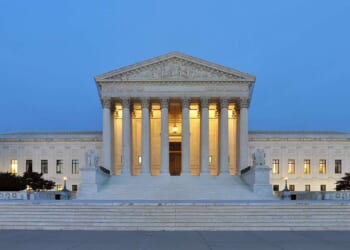Most politicians never forget the races they lost. But perhaps no elected official has ever been as fixated on an electoral defeat as President Donald Trump.
Despite successfully recapturing the White House last November, Mr. Trump has continued to circle back with regularity to the 2020 election, which he still insists was stolen from him. In remarks as well as presidential actions, he appears intent on reshaping the official narrative surrounding his four-year-old loss – even as new evidence continues to reinforce the reality of that defeat.
Mr. Trump frequently frames the presidency of Joe Biden as illegitimate. The war in Ukraine “would never have happened if the 2020 Election had not been RIGGED, in other words, if I were President,” he wrote on Truth Social on April 13. He has made similar claims about the Oct. 7, 2023, Hamas attack on Israel.
Why We Wrote This
Even as defamation lawsuits continue to find no evidence of a fraudulent election, President Donald Trump keeps insisting that the 2020 vote was “rigged.” He’s issuing orders targeting officials and lawyers whose work undercut his claims, and demanding states tighten voting rules to prevent alleged fraud.
As president, Mr. Trump has pushed out members of the Justice Department who investigated his efforts to overturn Mr. Biden’s victory, which culminated in the attack on the U.S. Capitol on Jan. 6, 2021. His administration reportedly vetted appointees specifically on their views of who won the 2020 election. One of his first official acts as president was to pardon hundreds of people convicted of federal crimes related to the Jan. 6 rioting, which resulted in the loss of lives among both protesters and police, and injuries to more than 140 law enforcement officers.
Parallel to his actions looking back to 2020, Mr. Trump has also sought to dictate how states run elections, asserting power to enforce federal laws in a sweeping executive order that includes provisions on mail-in ballots, proof of citizenship, and the certification of voting machines. Conspiracy theories about machines flipping votes to Mr. Biden featured prominently in Mr. Trump’s rearguard efforts in 2020 to stay in power. Multiple states are challenging the executive order in court.
While it is not clear whether it all stems from a deep insecurity, an effort to elevate his legacy, or a larger political strategy to wield greater power over future elections, Mr. Trump’s preoccupation with 2020 appears to be driving significant presidential actions and policies in ways that could have real implications for U.S. democracy.
“It’s a grievances politics that’s at the center of his worldview,” says Nicole Hemmer, a historian at Vanderbilt University who directs the Rogers Center for the American Presidency. “It’s about throwing into question the outcome of elections and damaging people’s trust in that outcome.”
Vetting appointees on their views of the 2020 election is a particularly chilling assertion of presidential power, says Professor Hemmer. “It’s not a test of whether you believe the election was stolen. It’s whether you are willing to say the election was stolen.”
In polls, a majority of Republican voters continue to say they believe the 2020 election was fraudulent, echoing Mr. Trump’s claims. Yet multiple judicial challenges, state audits, and defamation lawsuits related to fraud claims have come and gone without providing any basis for doubt about the outcome.
Mr. Trump’s rhetoric has already had a corrosive effect on democracy, says David Becker, who heads the Center for Election Innovation & Research, a nonprofit that works with election officials. In the wake of misinformation spread about 2020, unprecedented levels of abuse and threats have occurred against the state and local officials who oversee elections. “Public servants – Democrats and Republicans – have been hounded because of these lies,” he says.
He adds, “It’s unfortunate we have a losing candidate that won’t accept his loss.”
Defamation verdicts rebutting claims of fraud
One arena where Mr. Trump’s claims of a stolen election have been repeatedly punctured is in defamation cases. A series of lawsuits brought by Dominion Voting Systems against right-wing media outlets have highlighted the falsehoods told by Mr. Trump’s allies on air about the company, which manufactures electronic voting machines, scanning devices, and software.
Some Trump allies have faced their own defamation suits. Rudy Giuliani, Mr. Trump’s former lawyer, was found liable for defaming two Georgia election workers in connection with the 2020 election and ordered to pay a $148 million judgment. Kari Lake, who unsuccessfully ran for governor of Arizona in 2022, settled for an undisclosed amount last year with Stephen Richer, a GOP county recorder whom she had falsely accused of rigging her defeat.
In both cases, neither defendant contested the evidence presented in court, instead moving to the damages phase. Their acceptance of liability is telling, says Mr. Becker, a former civil rights attorney at the Department of Justice. “The truth is an absolute defense in defamation,” he says.
The latest defamation ruling came on April 9, when a judge in Delaware found that Newsmax had broadcast multiple false claims about Dominion. A jury is due to decide on potential damages later this month. In 2023, Fox News paid $787 million to settle with Dominion after a similar finding. Analysts say Newsmax, whose owner, Chris Ruddy, is a confidant of Mr. Trump, may also settle out of court with Dominion to avoid a jury trial.
On the same day as the Newsmax verdict, Mr. Trump ordered an investigation of Chris Krebs, his former director of the Cybersecurity and Infrastructure Security Agency. He had fired Mr. Krebs in November 2020 after the director said there was no evidence of computer fraud in the presidential election. His agency had called the election “the most secure in American history,” infuriating the embattled president.
Mr. Trump also signed an executive order to end federal contracting with a Houston-based law firm that represented Dominion in its defamation lawsuits against media organizations. Susman Godfrey, the latest law firm to be targeted, has since won an injunction from a federal judge temporarily blocking the order, which the judge called “a shocking abuse of power.”
Mr. Trump “promised retribution, and that’s what’s going on,” says Jane Kirtley, a professor of media ethics and law at the University of Minnesota. “He’s very thin-skinned, and he has a very long memory.”
The executive action against Mr. Krebs is notable for naming an individual rather than an institution such as a law firm or university. It revokes security clearances held by Mr. Krebs, who is now a cybersecurity consultant. And it calls him “a significant bad-faith actor who weaponized and abused his Government authority,” claiming that he censored conservative viewpoints.
While signing the document, Mr. Trump claimed falsely that “more and more fraud” had been discovered about the 2020 election. “So, we’ll find out whether or not it was a safe election, and if it wasn’t, he’s got a big price to pay, and he’s a bad guy,” he said, referring to Mr. Krebs.
This “illegitimate use” of presidential power is deeply troubling, says Professor Hemmer. “The 2020 loyalty test is one you have to pass to be part of the administration. Now we’re seeing the flip side,” she says. “You will be singled out and punished” for dissent.
Official actions around voting
Mr. Trump’s March 25 executive order on “protecting the integrity” of elections doesn’t refer explicitly to 2020, but it justifies its actions as necessary to prevent fraud. It would require those who register to vote to prove their citizenship, impose stricter deadlines for mail-in ballots, and empower federal agencies to review state voter lists. Several lawsuits have been filed against it by states and left-leaning groups. Some conservatives have also criticized it as federal overreach that flouts states’ constitutional rights to run elections.
“Elections may have national consequences but the power to conduct them rests in state capitols. No public mandate, real or perceived, lets Washington tamper with this authority, not even for a worthy cause like election integrity,” wrote former Senate Majority Leader Mitch McConnell in an opinion piece in The Wall Street Journal earlier this month.
Congress has also taken up the issue of citizenship and voter registrations. The House recently passed the SAVE Act, which imposes new mandates that Republicans argue are needed to prevent noncitizens from voting. It’s already illegal for noncitizens to vote in federal elections, and instances appear to be very rare. Many Democrats say proof-of-citizenship requirements would disenfranchise legitimate voters who don’t have ready access to documents such as birth certificates.
Mr. Trump has repeatedly claimed without evidence that Democrats are getting votes from immigrants who are in the country illegally. After he won the Electoral College but lost the popular vote to Hillary Clinton in 2016, he set up a commission to investigate such alleged illegal voting. The commission disbanded after failing to turn up proof to support Mr. Trump’s claims. In the 2024 campaign, Mr. Trump and his allies made further claims without evidence, including that that Democrats had “imported” millions of migrants into swing states to vote for his opponent, Kamala Harris.
Polling shows that a majority of Americans support anti-fraud measures such as voter ID and citizenship checks, says Matt Germer, who heads the governance policy program at the R Street Institute, a think tank in Washington that favors limited government and free markets. But he’s concerned that “fearmongering” by Mr. Trump is undermining public faith in the ballot box. “Our elections are trustworthy,” he says.
Ironically, the push from Republicans for stricter rules on voter registration may cut against their own partisan interests. While Democrats may once have benefited from making it easier to cast a ballot, that’s now at odds with the coalition assembled by Mr. Trump, which includes many irregular voters who only turn out when he is on the ballot.
“Republicans are now becoming the party of late-deciding, low-propensity voters who may not be showing up to the polling stations with all their documentation,” says Mr. Germer.










